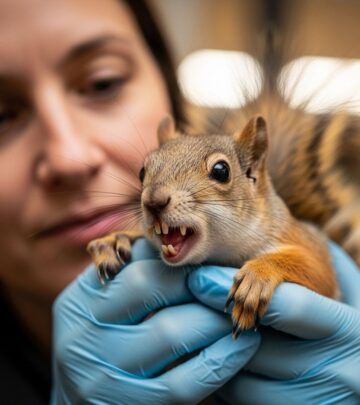Hedgehog Tooth Diseases: Identification, Treatment, and Prevention for Pet Owners
Simple at-home checks can spot early signs of mouth discomfort before problems develop.

Hedgehog Tooth Diseases: Identification, Treatment, and Prevention
Pet hedgehogs, with their distinctive appearance and gentle natures, have become increasingly popular companions across the globe. While their unique biology makes them fascinating pets, hedgehogs are prone to dental and oral diseases that can severely impact their health and quality of life if left untreated. This thorough guide covers the core topics of hedgehog dental health, including symptoms, common diseases, treatment strategies, preventive tips, and answers to frequently asked questions for responsible owners.
Understanding Hedgehog Dental Anatomy
Hedgehogs are omnivorous mammals with jaws and teeth well-adapted for a varied diet. Their teeth, unlike rodents, do not grow continuously but have closed root canals and are relatively coarse with a primitive structure. Their dental makeup includes sharp incisors, small canine teeth that often resemble incisors, and wide, flat molars and premolars for grinding food. This anatomy is essential for effective feeding and maintaining overall health, but also predisposes hedgehogs to certain oral conditions as they age or encounter dietary challenges.
Prevalence and Causes of Dental Disease in Hedgehogs
Dental and gum diseases are common in captive hedgehogs. The most frequently seen issues arise from:
- Bacterial Infections leading to periodontal disease
- Poor diet, often lacking enough abrasiveness for natural teeth cleaning
- Age-related degeneration, such as excessive tooth wear
- Genetic predisposition to dental disorders
Environmental factors, such as a lack of hard foods or poor cage hygiene, can exacerbate dental problems, while injuries or abscess formation may lead to serious oral health complications.
Symptoms of Tooth and Gum Disease in Hedgehogs
The early warning signs of dental disease are often subtle, but recognizing them is crucial for prompt intervention. Common symptoms include:
- Excessive salivation or drooling
- Difficulty eating or loss of appetite (anorexia)
- Bad breath (halitosis)
- Pawing at the mouth or visible bleeding
- Weight loss or general lethargy
- Visible abscesses or swelling around the jaw
- Loose, broken, or missing teeth
Advanced symptoms can also include significant inflammation, purulent discharge, reluctance to open the mouth, or even visible tumors.
Common Dental Diseases in Hedgehogs
Hedgehogs may suffer from several types of oral and dental conditions:
- Periodontal Disease: Chronic gum inflammation caused by bacteria, often leading to tooth loss and systemic infection.
- Gingivitis: Mild to severe gum inflammation, frequently an early stage of periodontal disease.
- Tooth Fractures: Broken or chipped teeth due to trauma or biting hard objects.
- Dental Abscesses: Accumulation of pus around the base of teeth or jaw, typically requiring veterinary intervention.
- Excessive Tooth Wear: Mostly seen in older hedgehogs, which may need a specialized diet.
- Oral Tumors: Squamous cell carcinoma is notably common, requiring surgical treatment in most cases.
- Stomatitis: Mouth lining inflammation, can develop if males bite their mates or due to systemic illness.
Diagnosis of Dental Problems in Hedgehogs
The unique behaviors and anatomy of hedgehogs can make thorough oral examinations challenging. Veterinarians often use sedation or general anesthesia for a complete assessment. Diagnosis typically involves:
- Physical examination of the mouth and teeth
- Radiographs (X-rays) to detect hidden infection, tooth root abscesses, or bone loss
- Oral swabs/cultures to identify infectious organisms
- Blood tests to rule out systemic illness
Diagnostic findings help guide treatment and provide insight into disease progression.
Treatment Options for Hedgehog Dental Disease
Treatment varies by the disease stage and specific diagnosis. Standard approaches include:
- Antibiotics: Used for bacterial periodontal disease, abscesses, or secondary infections
- Dental Cleaning (Prophylaxis): Removal of tartar and plaque under anesthesia
- Tooth Extractions: Removal of severely infected or damaged teeth to prevent systemic spread
- Soft Diet: Given after tooth extraction or to elderly hedgehogs with excessive wear
- Surgical Removal of Tumors: May be necessary for oral neoplasia, in conjunction with adjunct therapies
- Pain Management: Analgesics are critical for comfort during recovery
Notably, hedgehog teeth do not continuously grow, so trimming is unnecessary and can cause harm. Complex cases (such as dental abscesses with Actinomyces infection) may require specialized anaerobic culture and extended antibiotic therapy. Veterinarians may recommend periodic dental checks for hedgehogs older than 18 months, as most dental diseases manifest with age.
Preventing Dental Problems in Pet Hedgehogs
Dental health in hedgehogs can largely be maintained through consistent care and preventive strategies:
- Dietary Management: Offer hard kibble or appropriately abrasive foods to prevent plaque buildup
- Routine Oral Checks: Regularly inspect your hedgehog’s mouth for changes, especially in older pets
- Veterinary Exams: Schedule annual wellness visits with dental screening, or more often for aging hedgehogs
- Prompt Treatment: Address symptoms early to prevent escalation
- Environmental Hygiene: Keep the cage clean to reduce exposure to pathogens
- Avoid offering excessively hard, unchewable treats (like large raw peanuts) that can lead to trauma
Early intervention and professional dental care substantially reduce risks of complicated disease and help ensure a long, healthy life for your pet.
Special Considerations for Older Hedgehogs
Aging hedgehogs are predisposed to dental problems, from excessive wear to loosened or lost teeth. Owners should:
- Transition the hedgehog to a softer diet, especially after dental extractions or significant tooth loss
- Monitor for signs such as weight loss or messy eating
- Consult regularly with a vet familiar with exotic animal dental care
Careful management allows older hedgehogs to thrive without persistent discomfort.
At-Home Care Tips for Hedgehog Dental Health
- Observe daily for subtle signs of oral discomfort
- Handle gently—hedgehogs often curl up or ball tightly when stressed, making oral checks harder
- Minimize exposure to other sick hedgehogs or contaminated bedding, as oral infections can be secondary to other illnesses
- Record any changes in eating patterns or salivation and report these immediately to your vet
When to Contact a Veterinarian
Contact your veterinarian if you notice any of the following:
- Refusal to eat for more than 24 hours
- Continued drooling or difficulty swallowing
- Visible bleeding, blood-tinged saliva, or swelling around the mouth or face
- Loose, broken, or missing teeth
- Persistent bad breath
- Rapid weight loss or lethargy
Prompt veterinary intervention is essential to prevent potentially life-threatening complications such as systemic bacterial infection, severe abscesses, or oral cancers.
Frequently Asked Questions (FAQs)
- Q: Why do hedgehogs commonly get dental disease?
- A: Hedgehogs predisposed to dental disease due to their tooth anatomy, dietary habits, and age-related degeneration. Captive environments may lack sufficient hard foods for natural cleaning, and genetic factors play a role.
- Q: Can I brush my hedgehog’s teeth?
- A: While tooth brushing is rarely practical due to hedgehog behavior, feeding abrasive foods, such as hard kibble, is recommended for cleaning teeth.
- Q: How often should my hedgehog receive dental exams?
- A: Hedgehogs over 18 months should have annual veterinary dental checks. More frequent visits are warranted if symptoms appear.
- Q: What are the risks of untreated dental disease?
- A: Untreated dental disease may result in tooth loss, severe pain, abscess formation, jaw infections, systemic illness, or death in extreme cases.
- Q: Can tooth problems be reversed?
- A: Early-stage gum disease may be managed or reversed with cleaning and diet changes, but advanced disease often requires extractions and ongoing care.
Quick Reference Table: Hedgehog Dental Disease Signs and Responses
| Symptom | Possible Cause | Recommended Action |
|---|---|---|
| Drooling / Salivation | Periodontal disease, oral pain | Veterinary dental exam |
| Difficulty Eating | Pain, loose or fractured teeth | Switch to soft diet, vet assessment |
| Bad Breath | Bacterial gum infection | Dental cleaning, antibiotics |
| Pawing at Mouth | Oral discomfort | Oral inspection, possible sedation |
| Visible Blood or Swelling | Gum disease, tooth loss, abscess | Immediate vet treatment |
Conclusion
Dental health is an essential—and often overlooked—aspect of hawg care. By understanding the causes, symptoms, treatment options, and preventive strategies for tooth diseases, pet owners can ensure their hedgehogs remain comfortable, active, and healthy throughout their lives. Timely intervention, routine checks, and informed dietary choices are critical for preventing the progression of oral diseases and promoting well-being in these captivating pets.
References
- https://www.merckvetmanual.com/exotic-and-laboratory-animals/hedgehogs/diseases-of-hedgehogs
- https://journals.tubitak.gov.tr/veterinary/vol38/iss1/1/
- https://swanimalhospital.com/wp-content/uploads/2017/04/Hedgehog-handout.pdf
- https://vcahospitals.com/know-your-pet/hedgehogs-problems
- https://www.dvm360.com/view/diseases-and-treatment-pet-hedgehogs-proceedings
Read full bio of medha deb












